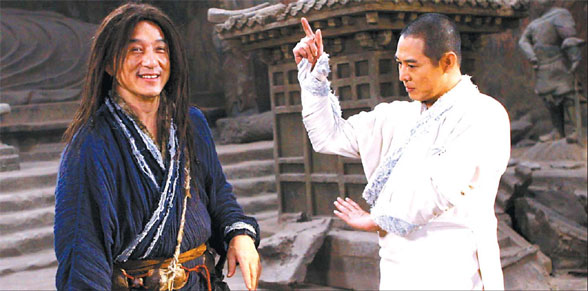
Jackie Chan (left) and Jet Li, the two martial art icons meet in The Forbidden Kingdom.
If Jet Li fights Jackie Chan, who will win? The audience will, says Rob Minkoff, director of The Forbidden Kingdom (Gongfu Zhi Wang), which premieres in North America today opens in China six days later.
It has been a dream come true for Chinese martial art lovers to see the two icons in one film. The story starts with a dream. Jason, an American teenage kungfu fan enters a fantastic world through the "gate of no gate," and embarks on the mission to rescue the Monkey King, who's trapped in a stone by his foe, Jade Warlord. Like the young Hobbits in The Lord of the Rings, Jason has several powerful escorts, including a silent monk played by Li and a drunken wanderer played by Chan.
The family-friendly film is a collaboration of scriptwriter John Fusco and Li. Several years ago Li was seeking a story for his daughter, and from a number of candidates sent to him he picked Fusco's, which was loosely adapted from the classic Chinese novel Journey to the West. It is a mix of Chinese mythology and tales and features a chaotic scene in which the Monkey King and Shaolin Temple monks fight together.
However, Li worried that the story was too much of a spoof for Chinese audience to accept. He suggested changing the storyline into a dream sequence. In dreams, anything can happen.
Minkoff is also quick to assume Chinese cinemagoers that the film in no way cheapens Chinese culture. He was even told by his Chinese wife, a descendant of the saint Confucius, and her parents that they would not tolerate cultural mockery.
"They put great pressure on me," he says jokingly. "I made sure that the characters are true to themselves, and to the core values they were endowed by Chinese culture."
Li has also helped introduce Chinese philosophy to the film. For example, when Jason asks Li's monk what to do when he is in danger, the monk replies: "Keep breathing". The two masters not only teach the boy kungfu, but also the importance of respecting his teachers.
"It has long been my wish to promote Chinese culture," Li says. "But it is a huge and complicated culture, so we may have to start with a simple approach first.
"To present a little bit of everything in an interesting way may be easier for Western audiences."